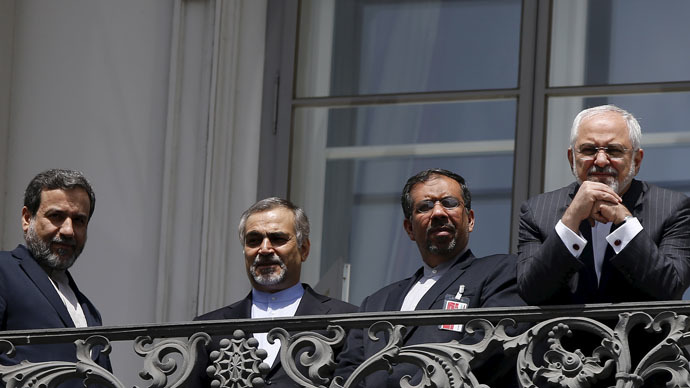Blame game: Progress in Iran deal ‘painfully slow,’ Tehran laments ‘excessive demands’

Iran and the six world powers have yet again shifted a deadline for a deal on Tehran's nuclear program, with both sides blaming each other. Iran has accused P5+1 countries of excessive demands, while the US says it will not “wait forever” for a decision.
"If the West gives up its excessive demands, we will certainly have a good deal in the nuclear negotiations with the P5+1," Iran's First Vice President Es-Hagh Jahanguiri told Iranian media on Friday, according to AFP.
His statement echoed a comment on Thursday from Foreign Minister Mohammad Javad, who also accused “several countries” in the P5+1 group of changing their position and making “excessive demands.”
He added that each of the nations in the P5+1 group – the US, Britain, France, Germany, Russia, and China – “have different positions which makes the task even harder.”
#Putin LIVE: #Iran sanctions should end ASAP, don’t work http://t.co/BsSIpBBadE#IranTalksViennapic.twitter.com/rxlwpmcDVz
— RT (@RT_com) July 10, 2015
However, neither side is giving up just yet, as talks are still continuing on Friday. They will likely continue into the weekend, and possibly to Monday.
British Foreign Secretary Philip Hammond was somewhat optimistic on Friday, though he admitted the progress is “painfully slow,” adding that “there are still some issues that have to be resolved.”
Hammond expressed hope that experts working behind the scenes will “clear some more of the text and then we can re-group tomorrow to see if we can get over the last hurdles."
Meanwhile, US Secretary of State John Kerry said on Friday, "We're working hard. We're pushing."
However, Kerry expressed less optimism just one day prior, warning that Washington will not “wait forever” for a decision to be made.
“President Obama made it very clear to me last night. You can't wait forever for the decision to be made; we know that. If the tough decisions don't get made, we are absolutely prepared to call an end to this process,” he told reporters on Thursday.
TIMELINE: Iran's nuclear program controversy from 1957 to present http://t.co/Nu5GIz23Lnpic.twitter.com/eCN1LTixtA
— RT (@RT_com) July 7, 2015
EU foreign policy chief Federica Mogherini has also said it is time for a "yes” or “no" decision.
"We are very close, but if the important, historical decisions are not made in the next hours we won't have an agreement," she told CNN on Thursday.
Russian President Vladimir Putin said on Friday that Iran's nuclear deal should first aim at ensuring global security, adding that he hopes for a lifting of Iran sanctions as soon as possible, following a compromise at the negotiating table.
Friday marks the fourteenth day of this round of negotiations, following two previously missed deadlines in July and November of last year.
Western countries have long accused Tehran of using its nuclear program to develop nuclear weapons – a claim that Iran adamantly denies. A nuclear deal would see Iran curbing its nuclear program in exchange for sanctions relief.
The US and European Union both announced on Friday that they have suspended Iran sanctions until July 13 as the negotiations continue in Vienna.
Effect on oil
If the nuclear negotiations are stalled or significantly delayed, Iran will be unable to get sanctions relief allowing it to ramp up its oil exports in the coming months.
Markets have been concerned that a fresh oil supply from Iran could add to global oversupply and push down prices further.
A further fall in oil prices would result in a recession in US shale; it wouldn’t be cost-effective to invest in shale, that’s how the market self-regulates, Russian Finance Minister Anton Siluanov told RT on Thursday.
America still Iran’s enemy, nuclear deal or not – Iranian army commander http://t.co/s6ph6UWRzRpic.twitter.com/ok5CCx1JGZ
— RT (@RT_com) July 6, 2015
Iran has said it wants to nearly double its crude exports as soon as the sanctions are lifted, to battle its competitors for market share – from 1.2 million barrels to 2.3 million barrels per day.
But despite Tehran's intention, that goal can't be achieved overnight, according to Daniel Wagner, CEO of Country Risk Solutions.
Iran “has to have buyers, and in this kind of a marketplace, where the market is actually depressed, getting those kind of buyers would be very different than if it was a more robust marketplace. So I think we're talking a matter of months, at a minimum,” Wagner told RT on Thursday.
If a deal is not reached, however, the sanctions will not be lifted and Iran will therefore not have an opportunity to increase its market share at all.












